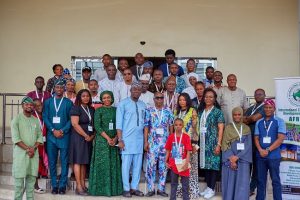The International Climate Change Development Initiative (ICCDI) and the National Council on Climate Change (NCCC) have pledged their support to various state governments in championing a just transition in the country.

This commitment was the central theme of a recent daylong workshop on empowering communities through inclusive and just transitions, which took place in Osogbo, the capital of Osun State.
To guarantee a just and equitable distribution of resources and opportunities, the government of Osun State has reportedly been seeking ways to transform its economy.
The term “just transition” refers to transitioning from an economy that is dependent on fossil fuels to one that is sustainable and employs renewable energy sources, all while assuring the protection of workers’ rights and the participation of communities that have been excluded.
The ICCDI brings the conversation to the state to ensure its inclusion in the transition to a low-carbon and environmentally sustainable economy.
“There has been a significant amount of discourse on the transition in Nigeria, and as an organisation, we are committed to extending this conversation to communities. This is why we are in the state, to develop a roadmap for them on just transition. Our goal is to bring a community-based approach to the issue of climate change and transition,” Mr. Olumide Idowu, Executive Director of ICCDI Africa, said, as he emphasised the workshop’s role in bringing the conversation about just transition to communities.
With the support of ICCDI, the government of Osun State will be able to implement projects that harness renewable energy, adopt environmentally responsible agricultural practices, foster the growth of green industries, and create employment opportunities aligned with social justice and environmental sustainability.
This collaboration, said ICCDI, promises a brighter, more sustainable future for the people of Osun State.
“Just transition should advance climate actions and ensure decent work and economic growth,” Jummai, a representative of the NCCC, said on efforts being made to involve every state in the issue of climate change.
“Mr. Governor’s goal is for the state to soon be the first and leading subnational entity in the design and implementation of a climate action plan. The ultimate focus is to emerge as the most climate-adapted and resilient state within the African subnational space. The state government says it is open to partnerships to address the challenges of climate change,” said Mr Rasheed, the Govenor’s Spokesperson and Chairman, Climate Council, Osun State.
“The benefits of just transition. The things that we’ve been able to hear is to understand the benefits of just transition, ensuring that we move from the current practices as far as energy is concerned and then advance to the next level as far as energy is concerned,” disclosed Tolulope, one of the participants.
Friedrich Ebert Stiftung in Nigeria supported the workshop in partnership with the Coalition for Socioecological Transformation (COSET).
By Rukayat Odebiyi, Peoples Operations, ICCDI Africa
